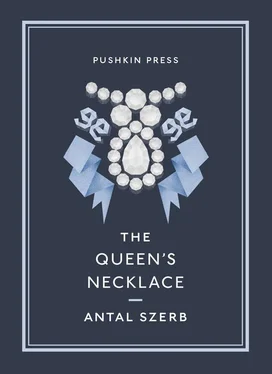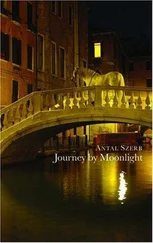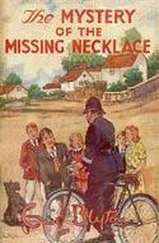Jeanne de la Motte’s fate was the first to be decided. In flat, unvarying tones her crimes were read out. When the time came to determine the sentence, two Councillors, one of them Robert de St Vincent, a passionate opponent of the monarchy, called for execution. This was just a manoeuvre. Had the discussion really got on to the death penalty, the clerical members of the Parlement would have been obliged to withdraw. It was a way of ensuring that thirteen of them would stay out of the debate, since, with two exceptions, they would have taken a stand against Rohan as a disgrace to his religious order. And so the two Councillors now demanded the ultimate penalty for Jeanne: “to be taken from this place and put to death”. The actual form her punishment would take, we shall see.
The Comte de la Motte was sentenced to the galleys for life. Réteaux got off extremely lightly, with lifelong banishment from the kingdom. D’Oliva and Cagliostro were acquitted, but on differing terms. D’Oliva was deemed hors de cour —dismissed from the court — while Cagliostro was acquitted on all counts. The first of these acquittals was less absolute than the second, having a certain implication of disgrace attached to it.
All these decisions had been handed down in a relatively routine manner. Now the real business began — deciding what to do about Rohan.
The discussion lasted seventeen hours, and the result was announced only at ten pm. Those who were sworn enemies of the Court, Fréteau de St Just and Robert de St Vincent, had made powerful speeches in Rohan’s defence. The outcome was that everyone voted for his acquittal, but they could not agree on the precise manner of it. Twenty-six speakers voted for outright acquittal, while twenty-two wanted simply to discharge him hors de cour . In the end there was a majority decision — Cardinal Rohan was completely cleared on all charges, with no shadow of infamy attaching to his name.
Paris received the verdict with widespread rejoicing. The Parlement’s popularity had increased yet again, and everywhere people drank to its health and the Cardinal’s. The fishwives, those proud representatives and symbols of the people, stood waiting for him in the courtyard with bunches of roses and jasmine, and clasped him to their bosoms with joy.
The next day he and Cagliostro left the prison. Later Cagliostro painted this moving picture of his return home:
“I left the Bastille towards eleven-thirty in the evening. The night was dark, and the quarter where I live was relatively abandoned. So, great was my surprise when I was suddenly greeted by some eight or ten thousand people. They had broken down the gate to my house. The courtyard, the staircase, the rooms — everywhere was packed. I took my wife in my arms. My heart could not endure the many feelings that contended for mastery within me. My knees were shaking. I fell unconscious to the floor. My wife shrieked and fainted. My friends gathered around me. They were trembling, not knowing whether this most beautiful moment of our lives was also its last, and the loud rejoicing turned into a grim silence. But I recovered myself. Tears poured from my eyes, and at last, as if in death, I clasped her to my bosom … but here I must leave off. Oh you privileged beings, on whom Heaven has bestowed the rare and melancholy gifts of ardent souls and sensitive hearts, only you could understand; only you could know what such an exquisite moment of happiness might mean after ten months of suffering!”
But let us intrude no further on the happy couple. We should rather consider how a somewhat more important, and much less happy couple, the King and Queen, received the news. The Queen’s sense of humiliation and grief was boundless. She had trusted that in the end the law would unequivocally condemn those who had brought scandal upon her, and the very opposite had happened. She could not understand how it was possible. She knew of no precedent for such a thing in all the annals of royalty. When her Habsburg relations had been on the Spanish throne, anyone who chanced simply to touch the Queen’s foot could expect the death sentence, but here someone could lay sacrilegious hands on her good name, her womanly honour … and the highest court in the land would find him not guilty. It was incomprehensible. She had no way of knowing that this incident no longer belonged in the annals of royalty but was the first hunting cry of the Revolution.
“So there you are,” writes Funck-Brentano: “The King entrusts the defence of the Queen’s honour to a court of law which is independent of him and is generally hostile to him. During the course of the trial the Finance Minister, the Minister of Justice and the King’s Librarian, Le Noir, all of them therefore in his confidence, are more or less openly manoeuvring to have Rohan acquitted. And no one is the least bit surprised. Is there any government today that would allow the freedom people enjoyed at that time?” This hypocritical sophistry, which insists that people were never so free as under the Ancien Régime, is the extraordinary conclusion, typical in its mauvaise foi , of French royalist writers. Funck-Brentano must surely have been just as aware as we are that what happened was not a sign of freedom but of impotence. Such events did not occur in the last days of the Ancien Régime because there was no tyranny, but because that tyranny had become weak. And an enfeebled tyranny is even more odious than a violent one. The situation cried out for the cleansing storm of 1789.
Louis XVI, incidentally, hastened to crown the two blunders he had made over the trial with a third. The one wise thing he could have done in the circumstances would have been to behave as if nothing had happened; a true king would never have admitted that his subjects had so upset him. Instead Louis gave free reign to his resentment, and set out to punish the pardoned Rohan as much as he could without risking a furore. The Grand Almoner was forced to resign his position and leave Paris within three days, to return to the Chaise-Dieu, the cloister where he had been a monk. Cagliostro was given eight days to leave Paris and three weeks to be out of France.
Naturally, the fairy godmothers could not acquiesce in this. Mme de Marsan called on the King and reminded him for the umpteenth time that she had nursed him as an infant and brought him up, and she implored him to send Rohan into exile somewhere else, as the climate at Chaise-Dieu would be so bad for his knees; and she threatened never to set foot in the Court again. But now that there was no need for it, Louis was obdurate. However this time he did not push the matter too far. He did eventually agree that Rohan could base himself at Marmoutiers, in the beautiful Loire valley.
And now we come to the final scene, in which Jeanne de Valois de la Motte undergoes her appropriate punishment. When she learnt that the Cardinal had been acquitted, Jeanne had one of her usual fits and began to rage. A soul filled with malicious fury finds its own misfortunes much easier to live with than the good fortune of others. She could not bear the fact that the Cardinal, who had always been so good and so chivalrous to her, should have escaped from the danger that she had brought on his head.
On 21st June 1786, she was woken by her warders at five in the morning. Thinking it must be something to do with another court hearing, she refused to get up. Finally, after much delay, she decided she would and went out into the courtyard. There she was seized by four powerful executioners assisted by two footmen, and bundled along to the foot of the stairs. She kicked out and bit, and the usual deluge of never-ending curses poured from her mouth. She was forced to her knees and made to listen while the sentence was read out. When she heard that she was to be birched, she shrieked:
Читать дальше












